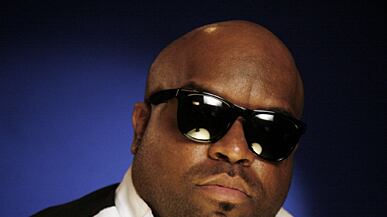Peter Lauria talks to the Grammy-nominated singer about why his mother's death was a "relief," music he admires (Billy Joel, Iggy Pop), and music he does not (Maroon 5).
The first thing you notice about Cee Lo Green is his smile. It is big and bright and welcoming. The sparkle from his teeth matches that of the red-jewel studded bracelet he frequently wears on his right wrist. And these days, Cee Lo has plenty of reason to smile—ironic, given that his most recent album, The Lady Killer, was birthed from, to use his words, the pain of "one too many heartbreaks."

But Cee Lo seems to have a talent for channeling personal pain into potent pop music. This year he scored a viral video hit, not to be mention five Grammy nominations, including Record of the Year and Song of the Year, for "F--- You," a song ostensibly about getting dumped by his lady for a richer man. After nearly 20 years toiling in relative obscurity as a founding member of Atlanta-based rap group Goodie Mob, and as a solo artist, the song marked Cee Lo's second smash hit in three years—the first was 2007's "Crazy," the result of his collaboration with Danger Mouse in the duo Gnarls Barkley.
On the eve of his hugely successful Saturday Night Live appearance last weekend, Cee Lo spoke to The Daily Beast about his big commercial breakthrough, his Grammy disappointment in losing to the Dixie Chicks in 2007, the death of both his parents by the age of 18, and surviving the music industry. Below is an edited excerpt from our conversation.
So, five Grammy nominations for "F--- You" seems to be a good way to get over the girl in the song. Are you over your pain?
Oh, no pain. The girl in the song is a figment of my imagination. She's not a whole truth. She's an idea born out of a mixture of people. There's no one woman that can hurt me that bad.
Are you with somebody now?
No.
Single?
Yeah, for the most part.
You once said that you've been underground and the underdog for far too long. So how does it feel to now be so embraced?
It's gratifying. I think that quote itself—there was actually a little spin on it. I didn't mean to say that I needed more recognition. I just meant that the underdog thing works for me. There's just something about the stance that I take, it just has this working-class kind of quality. It's just my trope, you know?
If you don't win Record of the Year, are you going to jump onstage in protest like Kanye?
I doubt it. But I did feel like we were robbed when Gnarls Barkley was up for it [in 2007].
The Dixie Chicks' Not Ready to Make Nice won Record of the Year that year. You felt Gnarls was robbed?
“We more often have pain in common than we do happiness.”
Robbed is a strong word. I remember Kanye was sitting a few rows over [from me] and he was trying to get my attention. He was kind of looking at me teasing, like, "You want me to go for you?" Kanye's real cool and he was very outspoken about that. Honestly, I hadn't heard the Dixie Chicks' song as much as I'd heard my own, so I felt naturally that we would win, since we were there.
You're up against another country-pop act this year with Lady Antbellum's Need You Now. Have you heard that record?
I have. I like it. Actually, country is some of the best music out there.
Obviously, "Crazy" was a huge hit and it looked like you were finally going to have the big commercial breakthrough? Were you disappointed when Gnarls' second album came out and it fell flat?
I wasn't. I think that The Odd Couple was a great deal better. I think it was aesthetically better, technically better, than St. Elsewhere. Even sonically better. It's just that you don't get a second chance to make a first impression. And there's no better introduction than "Crazy."
"Crazy" and "F--- You" were crossover hits. But do you think most people who have heard those songs realize that you also have two solo albums and were part of the rap group Goodie Mob?
I don't think so. I've heard people say, "Why has Gnarls Barkley changed his name to Cee Lo Green?" There's a bit of a disconnect there. So in a lot of ways I'm a brand new artist to people.… If they do wish to inquire any further than the here and now, it's there.
You were on a major label, got dropped, went to an independent label, and now you are on a major label, Elektra/Asylum, again. What has been your experience with the business side of the music industry?
[pauses] Umm, the music industry is an animal that eats its young.
That's pretty harsh. Can you expand on that?
You know, you'd be fortunate to have any future in the music business. Very, very fortunate. I don't believe that it advocates for artistic enrichment or longevity. I feel that it's more about product and product placement. You know, shelf space and kickbacks [laughs]. I don't mean that as an insult. It's just an observation. Part of the task to accomplish is to be in [the industry] and not of it, so to speak. It is a necessary evil, "this thing of ours."
"This thing of ours" is a Mafia metaphor. Do you feel like the industry could whack you at any moment?
Yeah, I do. This is survival walking the tightrope. It's not necessarily a circus, where there's a safety net there to catch you. You got to make it. But, you know, taking that 100 percent of the risk, if you are willing to go all the way, if you make it, if you actually make it across, you reap 100 percent of that reward. But you know, it's not easy. Many have perished. I'm still in the middle of it. I haven't passed to the other side yet. I'm walking.
So then why be with a major label? I mean, with technology and digital distribution and name recognition like your own, you can go and market and promote your stuff to fans directly.
I know, but there you have to deal with the terms you already agreed to.
Ah, so maybe when your contract ends you might look to do something a little more independent?
Maybe so. Chances are, I mean, you don't necessarily get what you deserve, you get what you can renegotiate.
And it's better to renegotiate when you have leverage like a hit record.
Exactly. So lucky me [laughs]. Look out [laughs].
When people talk about you, they say things like, "Oh, he's a great guy," "happy," "fun," "always good to be around." But when you listen to "Crazy," and "F--- You," and some of your other songs, there's a lot of pain and anger and sadness that's obscured by these bouncy basslines. Are you darker then you let on?
I think I've been very outspoken about how dark it has been for me, with albums like St. Elsewhere and Odd Couple. Like, I was pleasantly surprised, but not really expecting, the way that those albums were so commercially celebrated. You know, these are serious matters veiled with a little comic relief. But you have to be able to anticipate adversity. It does come to challenge you from time to time, when it sees you as a worthy adversary. Adversity can take a win or a loss as a chance to fight.
Do you think people realized the themes of mental instability, delusions, and sadness in "Crazy" and on the rest of the album?
I don't think so. I think there's a difference between listening and hearing, you know what I'm saying. But, we more often have pain in common than we do happiness.… I did not realize I was being as honest as I was.
Tell me how the death of both of your parents before the age of 18 affected you. You've been quoted as saying you were a "thug" when you were younger and that your behavior was "maniacal."
My mother passed when I was 18. I started my professional career when I was 17. You know, you have to wonder how much living could you have done by 17, but, as we say in the South, I jumped off the porch really, really early. And I don't truly remember the innocence of childhood. I just remember knowing. And instinctively being aggressive about surviving, making a name, getting recognition, respect, these kinds of things. I've seen a lot of people not survive, and you know, survival just can't be secondary. It has to be a skill, and I'm like a soldier. In retrospect, it seems very normal and typical. You know, these are things that we go through as we mature from adolescents to young adults.
I think if the accident that had paralyzed her had killed her instantly, then I'm not sure what would have become of me. But to watch her suffer for three years, she was a quadriplegic, it was a very helpless feeling for me. I can truthfully say that for her to expire, to pass on, was relief. Probably more relief on her than me. I was very accepting and understanding about it. I thought it would be very selfish to have her suffer that way any longer.
People view you as a musical innovator. When you think of musical innovators, past or present, who comes to mind?
Billy Joel is one of the greatest songwriters of all time. He's one of my favorites. Sly Stone, I feel like is my [musical] godfather. There's just something kindred about him. There is a lot of optimism in his vocal approach and in his lyrics, you know, but there's also something very sad about it, too. I feel for him. Elton John, KISS.
KISS. Really?
Oh yeah, definitely. I was afraid of KISS to begin with. Just a striking image. Timeless. It scared the shit out of me as a kid. That's why I liked it.
You haven't named any hip-hop or R&B acts.
Public Enemy. Dr. Dre, of course, he's definitely an innovator. RZA from Wu Tang.
What are you listening to lately?
I'll listen to some Iggy Pop and the Stooges. I'll listen to some Frank Zappa. I like Kings of Leon. We were checking out the new Maroon 5 record, and I'm kind of apprehensive about talking about people, but it just makes a point that, "I love that first record," you get what I'm saying, I think I speak on behalf of almost everyone. But I don't know if it was their idea to change their sound or someone else's, but it's just not working for me. Sorry, [Maroon 5 singer] Adam [Levine]. Adam's a friend of mine.
You mentioned Kings of Leon. What about The Killers?
[Pauses, then looks at the recorder] Ummm, The Killers are cool. But to be honest, I didn't know what all the hot fuss was about. [laughs] Oh, I'm sorry, [Killer singer]Brandon [Flowers]. I like him, too. He's cool.
Hey, look, you can like someone personally and not have their music resonate with you.
I guess so. I guess I'm entitled to that. Yeah, cool.
Peter Lauria is senior correspondent covering business, media, and entertainment for The Daily Beast. He previously covered music, movies, television, cable, radio, and corporate media as a business reporter for The New York Post. His work has also appeared in Avenue, Blender, and Media Magazine, and he's appeared on CNBC, Bloomberg, BBC Radio, and Reuters TV.






